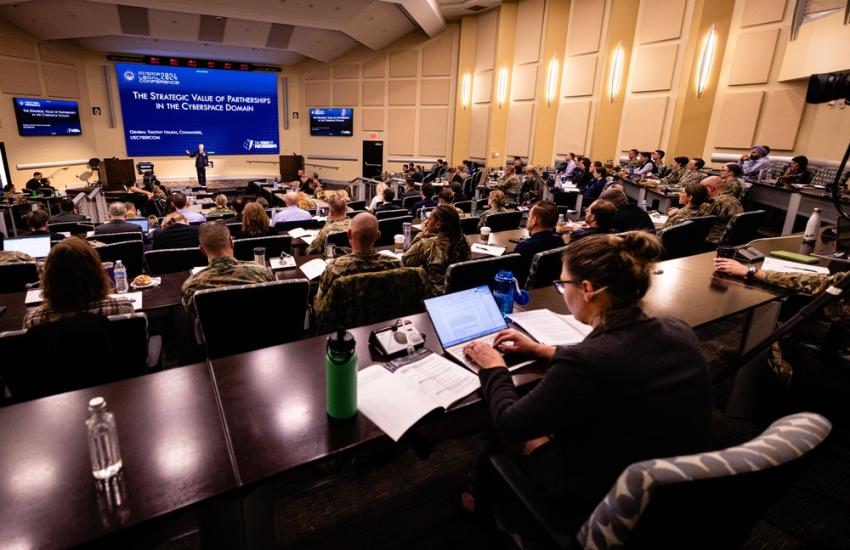Partnerships Are Key To Facing China’s Onslaught Against U.S. Defense Industrial Base
The People’s Republic of China (PRC) will seemingly stop at nothing to defeat America. The adversary is targeting the U.S. defense industrial base (DIB) through campaigns of espionage, sabotage, theft and disruption.
The nefarious efforts are designed to weaken the U.S. Department of Defense’s ability to protect the United States, warned commander of U.S. Cyber Command (CYBERCOM) Gen. Timothy Haugh, USAF.
“The PRC's efforts to steal intellectual property, gain critical infrastructure footholds and disrupt supply chains pose significant risk to DoD's ability to defend the nation," Gen. Haugh said June 25 at AFCEA International’s annual TechNet Cyber conference in Baltimore.
Haugh is also the director of the National Security Agency (NSA) and chief of the Central Security Service.
In addition, the PRC’s global manufacturing dominance is a threat. China owns seven of the 10 busiest ports in the world and has the second largest shipping fleet in the world. It also produces 96% of the world's shipping containers and more than 80% of the world's ship-to-shore cranes.
Moreover, the adversary is engaging thousands of intelligence, military and commercial personnel to steal U.S. intellectual property, in addition to influencing markets and trade, and disrupting the DIB’s supply chains, the commander warned.
“They are using vulnerabilities for advantage, and they are weaponizing them in campaigns of espionage, sabotage, theft and disruption, targeting the DIB,” Gen. Haugh stated.
As one of the nation’s critical elements of strength, the DIB must be on guard, especially since the PRC is acting with increasing agility and sophistication, he noted. Moreover, many state and non-state actors continue to pose great risks through their digital cyber warfare.
The People's Republic of China’s efforts to steal intellectual property, gain critical infrastructure footholds and disrupt supply chains pose significant risk to DoD's ability to defend the nation.
For many companies in the DIB where cybersecurity is not yet a top priority—as they focus on manufacturing, innovating and developing the tools that win wars—the commander advised them to partner with CYBERCOM and the NSA.
CYBERCOM has the authority to enter into arrangements with private sector entities to share threat information.
“This is where our partnership adds value,” Gen. Haugh stressed. “The DIB must enhance its cybersecurity., and the Cyber Command and NSA team are willing and eager partners to assist you.”
One collaboration effort, known as Under Advisement, has CYBERCOM maintaining key relationships with cybersecurity firms, researchers and individuals across the cyber ecosystem and the DIB. The stakeholders exchange information and work collaboratively, the commander said, to proactively address and counter threats.
In addition, the NSA’s Cybersecurity Collaboration Center allows CYBERCOM to work side by side with more than 1,000 public and private partners to identify foreign intelligence efforts to acquire sensitive proprietary technologies, the general noted. The Cyber Collaboration Center hosts briefings with cyber information security officers from the DIB and releases unclassified bulletins to provide understanding of the magnitude of the various threats.
Notably, CYBERCOM, the NSA, the FBI, Five Eyes nations and other partners have released scores of co-authored international unclassified cybersecurity advisories, detailing adversary attack vectors and the exploited vulnerabilities as well as mitigations.
“We share nonpublic specific threat intelligence to help prevent, detect and mitigate malicious cyber activity,” the commander explained.
The goal, Gen. Haugh said, is to develop a resiliency within the DIB that is anticipatory, adaptive and rapid.
“Defending the defense industrial base against malicious cyber actors is essential to the joint force and the defense of the nation,” Gen. Haugh stated. “Defending the DIB preserves our ability to develop warfighting capabilities, support deterrence and sustain global power projection.”
TechNet Cyber is an annual event held in Baltimore, Maryland, organized by AFCEA International. SIGNAL Media is the official media of AFCEA.






Comments